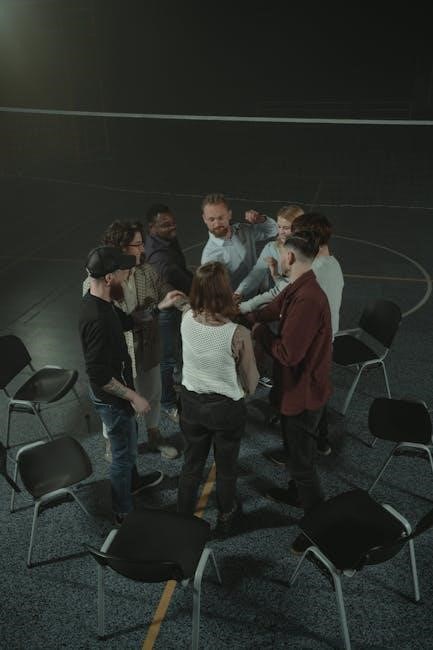Leadership workshops are interactive sessions designed to enhance leadership skills through structured activities‚ discussions‚ and real-world examples‚ often supported by downloadable PDF resources for continued learning․
What Are Leadership Workshops?
Leadership workshops are structured‚ interactive sessions designed to develop and enhance leadership skills through hands-on activities‚ group exercises‚ and real-world applications․ These workshops often include team-building games‚ communication exercises‚ and decision-making challenges to foster collaboration and problem-solving․ Many workshops incorporate downloadable PDF resources‚ such as activity guides‚ manuals‚ and exercises‚ to support learning and implementation․ They aim to equip participants with practical tools and strategies to improve their leadership abilities‚ addressing topics like principle-centered leadership‚ stereotype brainstorming‚ and experiential learning․ Workshops may also include audio resources‚ teleseminars‚ and community networking opportunities to reinforce leadership development․ These sessions are tailored for individuals‚ teams‚ or organizations seeking to nurture effective leaders and promote professional growth․
Objectives of Leadership Development Workshops
Leadership development workshops aim to enhance individuals’ leadership skills‚ fostering effective communication‚ decision-making‚ and problem-solving abilities․ These sessions focus on empowering participants to lead confidently‚ manage teams‚ and navigate challenges․ The primary objectives include cultivating self-awareness‚ improving interpersonal skills‚ and promoting collaborative teamwork․ Workshops also strive to equip leaders with practical tools and strategies to drive organizational success․ By addressing real-world scenarios and encouraging experiential learning‚ these programs help participants develop a growth mindset and adapt to evolving leadership demands․ Ultimately‚ the goal is to nurture capable‚ visionary leaders who can inspire and guide others toward achieving shared goals and fostering innovation․ These objectives are often supported by downloadable resources‚ ensuring continued learning and development beyond the workshop setting․
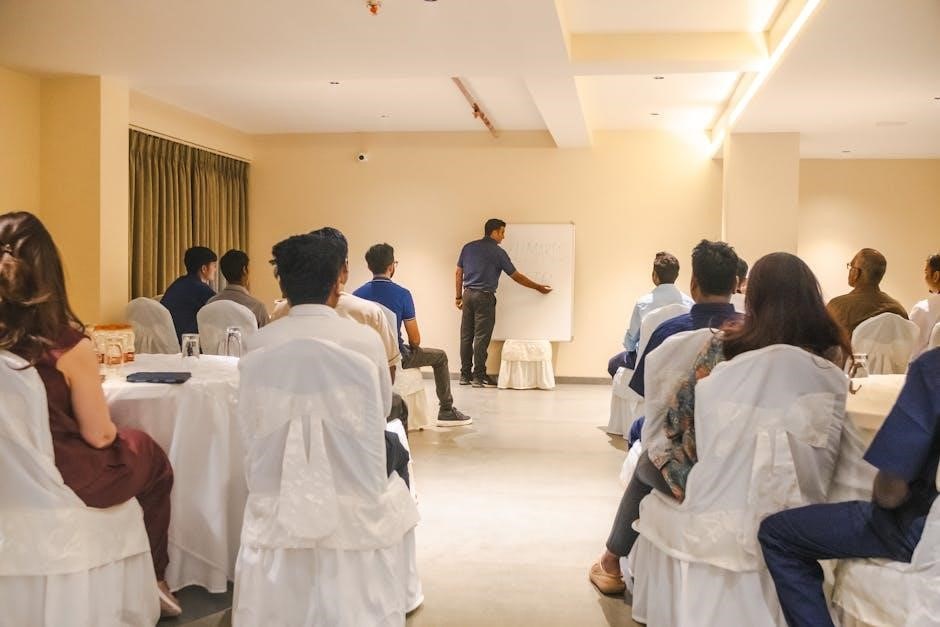
Categories of Leadership Workshop Activities
Workshops often categorize activities into exploration‚ establishing‚ facilitating‚ and exploring‚ ensuring diverse skill development through practical exercises and real-world applications‚ as detailed in PDF resources․
Exploration Activities
Exploration activities in leadership workshops focus on identifying personal strengths and understanding team dynamics․ These exercises encourage participants to reflect on their leadership styles and explore potential areas for growth․ One common activity involves brainstorming sessions where individuals list leadership traits and discuss stereotypes‚ fostering a deeper understanding of diverse leadership approaches․ Group exercises‚ such as listing facts or skills learned during training‚ also promote collaborative learning and self-awareness․ Additionally‚ experiential learning through games and interactive challenges helps participants internalize leadership concepts․ These activities are often supported by downloadable PDF resources‚ providing a comprehensive guide for both facilitators and participants to enhance their leadership journey․
Establishing Activities
Establishing activities are designed to set clear expectations and build a foundation for effective leadership development․ These exercises help participants identify key leadership traits‚ such as communication and decision-making‚ and align them with organizational goals․ Activities like listing leadership characteristics and discussing principle-centered leadership encourage participants to define their personal leadership style․ Group exercises‚ such as team role definitions‚ foster collaboration and accountability․ These activities also emphasize the importance of setting goals and expectations‚ ensuring a cohesive understanding of leadership roles within teams․ By establishing a shared framework‚ these exercises create a solid base for further skill development and practical application․ Many of these activities are detailed in downloadable PDF resources‚ providing structured guidance for facilitators and participants alike․
Facilitating Activities
Facilitating activities are designed to promote collaborative problem-solving and effective communication within teams․ These exercises help participants learn how to guide groups toward common goals and foster productive discussions․ Activities such as brainstorming sessions‚ group role-playing‚ and scenario-based challenges encourage leaders to practice active listening‚ conflict resolution‚ and decision-making․ Tools like discussion guides and activity manuals‚ often available in PDF formats‚ provide structured frameworks for these exercises․ By engaging in these activities‚ participants develop the skills to facilitate meetings‚ manage diverse perspectives‚ and create an inclusive environment for collaboration․ These exercises are essential for equipping leaders with the practical skills needed to lead teams effectively in real-world situations‚ ensuring alignment with organizational objectives and fostering a culture of shared responsibility․
Exploring Activities
Exploring activities are designed to help participants identify and develop their personal leadership style and potential․ These exercises encourage self-reflection‚ goal-setting‚ and understanding of individual strengths and weaknesses․ Activities such as personality assessments‚ vision mapping‚ and reflective journaling are commonly used․ Many of these exercises are supported by downloadable PDF resources‚ which provide detailed instructions and frameworks for personal development․ By engaging in these activities‚ participants gain a deeper understanding of their leadership capabilities and how to align them with organizational goals․ These exercises also foster a growth mindset‚ enabling leaders to continuously improve and adapt to new challenges․ The insights gained from exploring activities lay the foundation for effective leadership development and long-term professional growth․
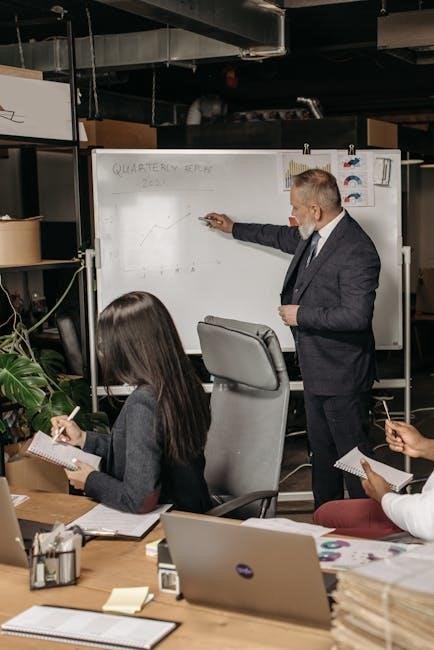
Popular Leadership Development Exercises
Team-building games‚ communication exercises‚ and decision-making challenges are popular‚ fostering collaboration and problem-solving․ These activities‚ often detailed in PDF resources‚ enhance leadership skills effectively in workshops․

Team-Building Games
Team-building games are essential in leadership workshops‚ fostering collaboration and trust․ Activities like “Moonball” and “The People Next To You” encourage quick thinking and cooperation․ These exercises‚ often detailed in PDF resources‚ help participants bond and develop problem-solving skills․ Games like “Hog Call” and “When Somebody Claps Twice” add fun‚ breaking the ice and promoting engagement․ Many workshops include competitive challenges where teams compete against their previous best efforts‚ enhancing teamwork and communication․ These activities are categorized under “Getting Acquainted” and “Energizers‚” ensuring diverse engagement․ By participating in such games‚ individuals not only build stronger relationships but also gain practical leadership insights‚ making these exercises a cornerstone of effective leadership development programs․ These resources are widely available in PDF formats‚ making them accessible for workshop organizers․
Communication Skills Exercises
Communication skills exercises are vital in leadership workshops‚ helping participants articulate ideas and listen effectively․ Activities like brainstorming leadership stereotypes and listing traits encourage open dialogue․ Participants engage in discussions to understand different communication styles and their impact․ Experts often share tips‚ enabling practical skill development․ These exercises‚ detailed in PDF resources‚ foster clarity and confidence in expression․ Role-playing scenarios and group discussions further enhance these abilities‚ preparing leaders for real-world challenges․ By refining communication‚ individuals can better inspire and guide their teams‚ making these exercises a key component of leadership development programs․ Such activities are widely available in downloadable PDF formats‚ ensuring accessibility for workshop organizers and participants alike․
Decision-Making Challenges
Decision-making challenges are essential in leadership workshops to refine critical thinking and problem-solving abilities․ These exercises often involve scenarios where participants must make swift‚ informed decisions under pressure․ Activities like brainstorming sessions‚ problem-solving games‚ and strategy planning encourage leaders to weigh options and consider consequences․ For example‚ participants might engage in exercises where they list facts or skills from their training‚ fostering quick thinking and collaboration․ Moonball‚ a competitive game requiring cooperation and fast reactions‚ is another popular activity that enhances decision-making skills․ Such challenges‚ detailed in PDF resources‚ help leaders develop confidence in their judgment and ability to guide teams effectively in real-world situations․ These exercises are designed to simulate practical dilemmas‚ ensuring leaders are prepared to act decisively when faced with challenges․
Problem-Solving Scenarios
Problem-solving scenarios are interactive exercises designed to enhance critical thinking and adaptability in leaders․ These activities often involve real-world dilemmas that require creative solutions․ Participants engage in brainstorming sessions‚ strategy planning‚ and collaborative decision-making to address challenges․ For example‚ exercises like listing facts or skills from training encourage quick thinking and teamwork․ Moonball‚ a fast-paced game requiring cooperation‚ is another example that sharpens problem-solving skills․ Such scenarios‚ detailed in PDF resources‚ help leaders develop practical approaches to complex situations․ By simulating real-world problems‚ these activities prepare leaders to navigate uncertainties and lead effectively․ They foster innovation‚ resilience‚ and the ability to think strategically under pressure‚ ensuring leaders are equipped to handle diverse challenges․ These exercises are integral to leadership development‚ enabling participants to apply their skills in dynamic environments․
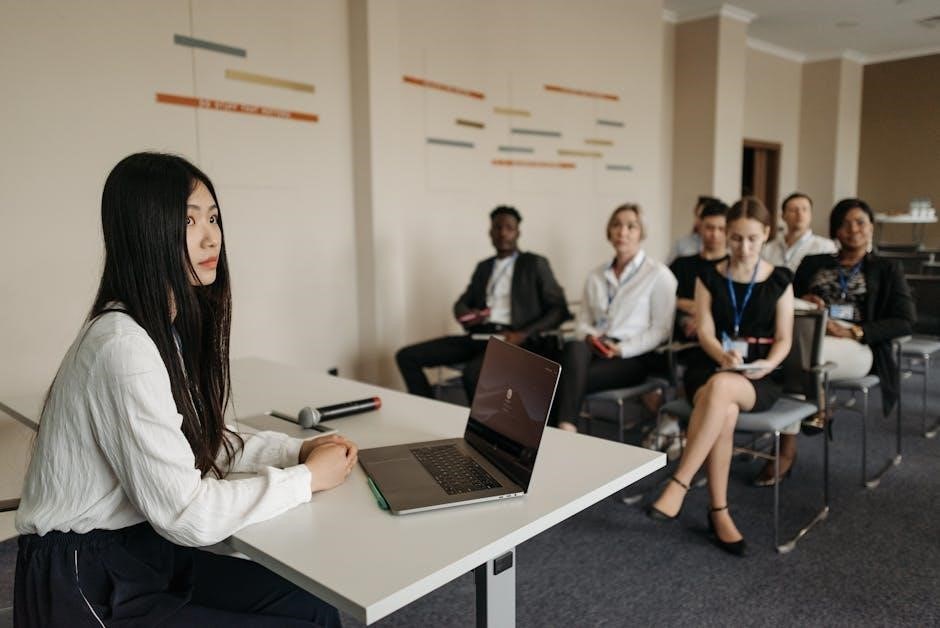
Designing Effective Leadership Workshops
Effective workshops combine clear objectives‚ engaging activities‚ and practical exercises‚ ensuring participants gain actionable skills․ Structured planning and diverse content‚ like PDF resources‚ enhance the learning experience․
Key Considerations for Workshop Design
When designing leadership workshops‚ it’s crucial to align activities with learning objectives‚ ensuring relevance and engagement․ Selecting a mix of exploration‚ establishing‚ and facilitating exercises enhances skill development․ Timing and duration must be balanced to maintain participant focus and energy․ Incorporating diverse resources‚ such as PDF materials‚ provides accessible tools for post-workshop reference․ Tailoring content to the audience’s needs and incorporating feedback loops ensures a personalized and impactful experience․ A well-structured agenda with clear outcomes helps participants stay on track and achieve measurable growth․ Balancing theory with practical application is essential for fostering lasting leadership capabilities․
How to Choose the Right Activities
Selecting appropriate activities for leadership workshops involves assessing participant needs‚ skill levels‚ and workshop objectives․ Activities should foster engagement‚ collaboration‚ and practical learning․ Consider using exercises from categorized lists in PDF resources‚ such as team-building games‚ communication drills‚ and decision-making challenges․ Ensure activities align with the workshop’s focus‚ whether it’s exploration‚ establishing‚ or facilitating skills․ Diverse exercises cater to different learning styles‚ enhancing overall effectiveness․ Additionally‚ incorporating feedback mechanisms and reflective practices helps reinforce learning․ Choosing activities that encourage active participation and real-world application ensures a dynamic and impactful experience for all attendees․
Timing and Duration of Activities

Effective leadership workshops require careful planning of activity timing and duration․ Activities should be timed to maintain engagement and align with learning objectives․ Shorter exercises‚ like icebreakers‚ can last 10–15 minutes‚ while more complex tasks‚ such as problem-solving scenarios‚ may require 30–60 minutes․ The overall workshop duration should balance activity time with breaks and reflections․ Ensuring a variety of activity lengths helps cater to different attention spans and learning styles․ Additionally‚ timing should allow for transitions between activities and final wrap-ups․ Properly structured timing enhances participant focus and maximizes the impact of each exercise‚ leading to a more productive and fulfilling experience․ Detailed activity schedules can often be found in PDF resources for leadership development workshops․
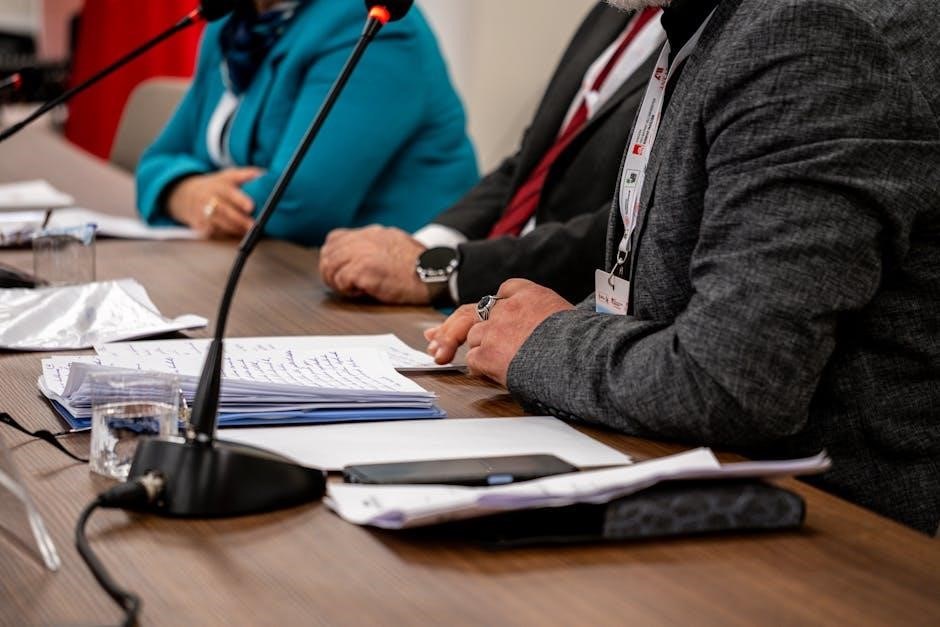
Tools and Resources for Leadership Workshops
Leadership workshops often utilize activity books‚ PDF guides‚ and online platforms to provide structured exercises and resources‚ ensuring participants can practice and apply leadership skills effectively․
Leadership Activity Books and Manuals
Leadership activity books and manuals are essential resources for designing effective workshops․ They often include a wide range of exercises‚ such as brainstorming leadership stereotypes‚ team-building games‚ and problem-solving scenarios․ These materials are designed to engage participants and foster practical skill development․ Many manuals are available in PDF format‚ making them easily accessible for trainers and participants alike․ They typically cover topics like communication skills‚ decision-making‚ and collaboration‚ providing structured activities to enhance leadership capabilities․ Additionally‚ these resources often offer real-world examples and case studies to illustrate key concepts․ By incorporating these tools‚ workshop facilitators can create dynamic and impactful learning experiences tailored to diverse audiences and settings․
Online Platforms for Workshop Materials
Online platforms offer a wealth of resources for leadership workshop materials‚ including downloadable PDFs and interactive tools․ Websites like AMACOM provide access to leadership activity books and manuals‚ while platforms like Chicas Poderosas host online workshops and activities․ These resources often include exercises such as brainstorming leadership stereotypes‚ team-building games‚ and problem-solving scenarios․ Many platforms also offer free or paid access to materials‚ making it easy for trainers to design engaging workshops․ Additionally‚ online communities and forums allow practitioners to share ideas‚ ask questions‚ and network with peers․ These platforms are invaluable for facilitating leadership development in various settings‚ ensuring that workshop materials are both accessible and adaptable to diverse needs․
PDF Resources for Leadership Development
PDF resources are invaluable tools for leadership development‚ offering accessible and downloadable materials for workshops․ These documents often include a variety of activities such as brainstorming leadership stereotypes‚ team-building exercises‚ and problem-solving scenarios․ Many PDFs categorize activities into exploration‚ establishing‚ facilitating‚ and exploring‚ ensuring a comprehensive approach to skill development․ They also cover essential topics like principle-centered leadership and decision-making challenges․ Resources from organizations like AMACOM and the International Association of Teamwork Facilitators provide trainers with structured and engaging content․ These PDFs are often designed to be adaptable‚ making them suitable for diverse groups and learning environments․ As a result‚ they are essential for both trainers and participants seeking to enhance leadership capabilities effectively․
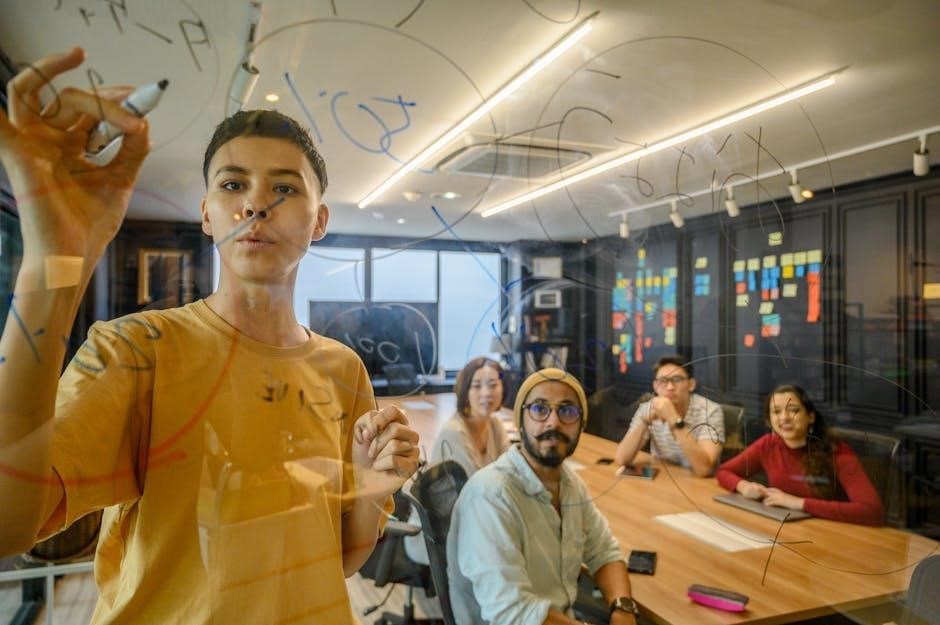
Case Studies and Examples
A workshop by Mohammed Bin Rashid Programme for Leadership Development successfully trained future leaders‚ focusing on communication and decision-making skills‚ with measurable improvements in team collaboration and problem-solving abilities․
Successful Leadership Workshop Outcomes
Effective leadership workshops yield measurable outcomes‚ such as enhanced communication‚ decision-making‚ and problem-solving skills․ Participants often report increased confidence in leading teams and resolving conflicts․ Workshops like those organized by the Mohammed Bin Rashid Programme for Leadership Development have demonstrated improved collaboration and innovation among attendees․ Many participants showcase better adaptability to challenges and stronger emotional intelligence․ These outcomes are further supported by downloadable PDF resources‚ which provide practical tools for continued skill development․ The combination of interactive exercises and real-world applications ensures lasting impact‚ equipping leaders to drive organizational success and foster a culture of continuous improvement․ Such workshops are integral to nurturing future leaders and achieving sustainable growth in various industries․
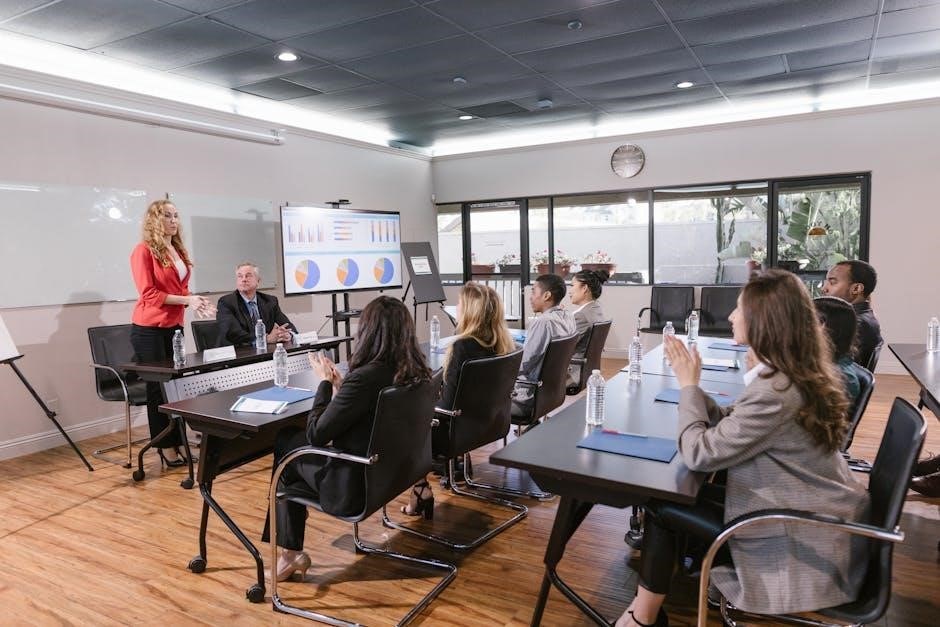
Real-World Applications of Workshop Activities
Leadership workshop activities are designed to translate into practical‚ real-world applications across various industries and roles․ For instance‚ team-building games like “Moonball” enhance collaboration and adaptability‚ directly applicable to project management and workplace dynamics․ Communication exercises‚ such as brainstorming sessions on leadership stereotypes‚ help professionals navigate diverse teams and improve interpersonal skills․ Problem-solving scenarios prepare leaders to tackle organizational challenges effectively․ Additionally‚ activities like “The People Next To You” foster empathy and inclusivity‚ essential for building strong‚ diverse teams․ These exercises‚ often detailed in downloadable PDF resources‚ empower individuals to apply learned skills in real-world contexts‚ driving innovation‚ improving decision-making‚ and strengthening leadership capabilities in their respective fields․ This ensures workshops deliver tangible‚ lasting benefits for both participants and their organizations․
Leadership workshops effectively enhance skills through team-building games‚ communication exercises‚ and problem-solving scenarios‚ offering practical tools for real-world applications‚ with PDF resources available for continued development․
Importance of Leadership Workshops
Leadership workshops are essential for fostering growth‚ collaboration‚ and innovation within teams․ They provide practical tools and activities‚ such as team-building games and decision-making challenges‚ to enhance leadership skills․ By engaging in these exercises‚ participants gain confidence‚ improve communication‚ and develop problem-solving abilities․ Workshops also encourage reflection and self-awareness‚ helping individuals identify their strengths and areas for improvement․ The structured environment of a workshop allows for immersive learning‚ making leadership development accessible and impactful․ Additionally‚ downloadable PDF resources extend the learning experience‚ offering continued guidance and support․ Ultimately‚ leadership workshops empower individuals to become effective leaders‚ driving success in both personal and professional contexts․
Future Trends in Leadership Development
Future trends in leadership development emphasize technology integration‚ personalized learning‚ and experiential approaches․ Virtual and augmented reality are becoming tools for immersive leadership simulations‚ while AI-driven platforms offer tailored development plans․ There is a growing focus on emotional intelligence‚ diversity‚ and sustainability as core competencies․ Microlearning and bite-sized workshops are gaining popularity for busy professionals․ Additionally‚ the rise of hybrid learning models combines in-person and online activities‚ enhancing accessibility․ PDF resources are evolving to include interactive elements‚ such as quizzes and actionable templates‚ to support ongoing development․ These trends reflect a shift toward adaptive‚ inclusive‚ and tech-enabled leadership training‚ ensuring leaders are equipped to navigate complex‚ dynamic environments effectively․
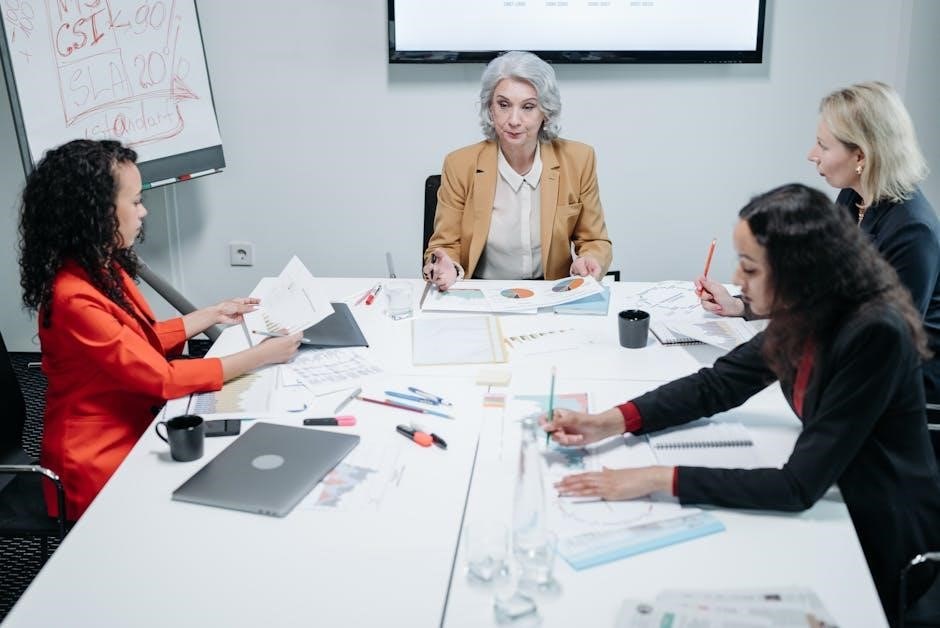
Additional Considerations
Effective leadership workshop activities require careful planning‚ fostering engagement‚ and measuring outcomes to ensure lasting impact‚ supported by accessible resources like PDF guides for sustained development․
Engagement Strategies for Participants
Engaging participants in leadership workshops requires interactive activities‚ such as brainstorming sessions‚ role-playing‚ and team-building exercises‚ to foster collaboration and active learning․ Incorporating real-world scenarios and problem-solving challenges encourages practical application of leadership skills․ Using visual aids‚ like videos and presentations‚ enhances understanding and keeps participants attentive․ Encouraging open discussions and feedback loops ensures that everyone feels valued and involved․ Additionally‚ incorporating short‚ energetic games or icebreakers‚ such as Hog Call or Moonball‚ can boost morale and create a relaxed environment․ Providing downloadable PDF resources with activity guides and reflection exercises allows participants to review and apply concepts post-workshop․ Regular breaks and opportunities for peer interaction further enhance engagement‚ ensuring a dynamic and impactful learning experience;
Measuring the Impact of Workshops
Assessing the effectiveness of leadership workshops involves using feedback forms‚ surveys‚ and skill assessments to gauge participant progress․ Pre- and post-workshop evaluations help measure changes in leadership understanding and application․ Feedback from participants and facilitators provides insights into the relevance and quality of activities․ Metrics such as improved communication‚ decision-making‚ and team collaboration are tracked to evaluate impact․ Follow-up sessions or interviews can further assess long-term skill retention and practical application․ Utilizing these tools ensures that workshops deliver measurable outcomes and identify areas for improvement․ Many of these assessment resources‚ including feedback templates and evaluation guides‚ are available in downloadable PDF formats for easy access and implementation․
